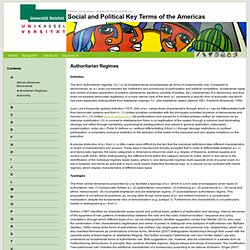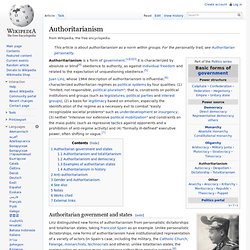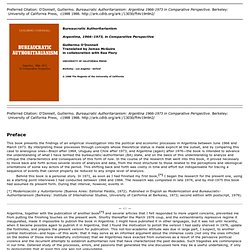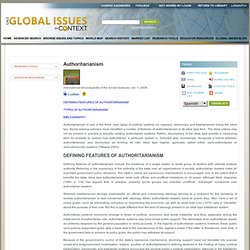

Social and Political Key Terms of the Americas - Main/Unterkapitel12. Definition The term 'authoritarian regimes' ('a.r.') in its broadest sense encompasses all forms of undemocratic rule.

Compared to democracies, an a.r. does not maintain the institutions and procedures of participation and political competition, fundamental rights and control of power (separation of powers, parliaments, elections, plurality of parties, etc.) characteristic of a democracy, and thus does not possess democratic legitimacy. In a more narrow view of the term, a.r. represents a specific form of autocratic rule which has been especially distinguished from totalitarian regimes ('t.r.', also totalitarian states) (Arendt 1951, Friedrich/ Brzezinski 1956). Authoritarianism.
Authoritarianism is a form of government.[1][2][3] It is characterized by absolute or blind[4] obedience to authority, as against individual freedom and related to the expectation of unquestioning obedience.[5] Juan Linz, whose 1964 description of authoritarianism is influential,[6] characterized authoritarian regimes as political systems by four qualities: (1) "limited, not responsible, political pluralism"; that is, constraints on political institutions and groups (such as legislatures, political parties and interest groups), (2) a basis for legitimacy based on emotion, especially the identification of the regime as a necessary evil to combat "easily recognizable societal problems" such as underdevelopment or insurgency; (3) neither "intensive nor extensive political mobilization" and constraints on the mass public (such as repressive tactics against opponents and a prohibition of anti-regime activity) and (4) "formally ill-defined" executive power, often shifting or vague.[7]

Www.du.edu/korbel/hrhw/researchdigest/latinamerica/argentina.pdf. - The Future of Democracy and Emergin Markets in Latin America Task Force.pdf. Bureaucratic Authoritarianism. Preferred Citation: O'Donnell, Guillermo.

Bureaucratic Authoritarianism: Argentina 1966-1973 in Comparative Perspective. Berkeley: University of California Press, c1988 1988. Preface This book presents the findings of an empirical investigation into the political and economic processes in Argentina between June 1966 and March 1973. By interpreting these processes through concepts whose theoretical status is made explicit at the outset, and by comparing this case to analogous ones—Brazil after 1964, Uruguay and Chile after 1973, and Argentina (again) after 1976—the book is intended to advance the understanding of what I have termed the bureaucratic-authoritarian (BA) state, and on the basis of this understanding to analyze and critique the characteristics and consequences of this form of rule.
Behind this book is a personal story. [*] Modernización y Autoritarismo (Buenos Aires: Editorial Paidós, 1972) . ― xii ― ― xiii ― One final word. . ― xiv ― Journal of Interamerican Studies and World Affairs, Vol. 26, No. 3 (Aug., 1984), pp. 415-431. Article. Authoritarianism is one of the three main types of political systems (or regimes), democracy and totalitarianism being the other two.

Social science scholars have identified a number of features of authoritarianism in its ideal type form. The ideal criteria may not be present in practice in actually existing authoritarian systems. Rather, descriptions of the ideal type provide a measuring stick for analysts to assess how authoritarian a particular system is. Scholars also increasingly recognize a hybrid between authoritarianism and democracy as forming its own ideal type regime, generally called either semi-authoritarian or semi-democratic systems (Ottaway 2003). Defining features of authoritarianism include the existence of a single leader or small group of leaders with ultimate political authority. Whereas totalitarianism strongly emphasizes an official and overarching ideology serving as a blueprint for the remaking of society, authoritarianism is less concerned with ideology. Social and Political Key Terms of the Americas - Main/Unterkapitel12.
Guillermo O'Donnell. Special Rapporteurship for Freedom of Expression. <div class="noscript-message"><p>It looks like JavaScript is either disabled or turned off.

Please enable JavaScript to correctly view this web site. </p><p>Parece que JavaScript está desactivado o apagado. Por favor, activar JavaScript para ver este sitio de web. </p><p>Afigura-se o JavaScript está desativado ou desligado. Por favor ative o JavaScript para visualizar este site. Article 13 - American Convention on Human Rights. Article.